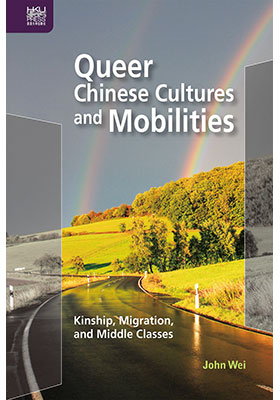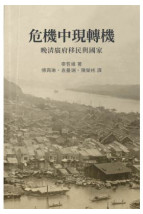Queer Chinese Cultures and Mobilities
Kinship, Migration, and Middle Classes
(中國酷兒文化與流動性研究:親情、移民與中產階級)
ISBN : 978-988-8528-27-1
January 2020
216 pages, 6″ x 9″, 9 b&w illus.
- HK$495.00
Ebooks
Also Available on
In Queer Chinese Cultures and Mobilities, John Wei brings light to the germination and movements of queer cultures and social practices in today’s China and Sinophone Asia. While many scholars attribute China’s emergent queer cultures to the neoliberal turn and the global political landscape, Wei refuses to take these assumptions for granted. He finds that the values and pitfalls of the development-induced mobilities and post-development syndromes have conjointly structured and sustained people’s ongoing longings and sufferings under the dual pressure of compulsory familism and compulsory development.
While young gay men are increasingly mobilized in their decision-making to pursue sociocultural and socioeconomic capital to afford a queer life, the ubiquitous and compulsory mobilities have significantly reshaped and redefined today’s queer kinship structure, transnational cultural network, and social stratification in China and capitalist Asia. With Queer Chinese Cultures and Mobilities, Wei interrogates the meanings and functions of mobilities at the forefront of China’s internal transformation and international expansion for its great dream of revival, when gender and sexuality have become increasingly mobilized with geographical, cultural, and social class migrations and mobilizations beyond traditional and conventional frameworks, categories, and boundaries.
“This timely and compelling contribution to Chinese/Sinophone studies and queer/sexuality studies is a pleasure to read. John Wei explores a diverse, fascinating, and unevenly explored archive of queer materials, deftly deploying scholarship in multiple fields to analyze the emergent formation of queer Sinophone cultures.” —David L. Eng, University of Pennsylvania
“John Wei’s meticulously researched and rigorously argued new book sets a new standard for queer Chinese studies. Bringing together a dazzling array of ethnographic materials, films, and digital media, Wei proposes the concept of stretched kinship to show us how questions of sexuality are always questions of mobilities as queer migrants become ineluctably entangled with China’s compulsory familism and developmentalism.” —Petrus Liu, Boston University






